10 Things We Learned From WWE Survivor Series 1998
The Rock, Corporate Champion…
The 1998 Survivor Series flies in the face of modern standards for what a good/great wrestling show is supposed to be. It's only got about two matches that would meet the loftier expectations of pay-per-view quality bouts, but of course - what does that matter when, story-wise, the show is about as complex and multi-layered as something off of Metallica's And Justice For All album? Though 1999 would mostly see WWE present shock value for the sake of it, 1998 saw finer tuning in the main event scene. Survivor Series 1998 sees some of that neater focus.
The 14-man tournament for the WWE Championship is beset with scheming and rigging from the corporate lever-pullers, with a sense of unpredictability hanging in the air. Give me that over two "great workers" that spend 23 minutes giving us the moves they always do, before spending the next 90 seconds giving us whatever finish needed to justify the samey rematch.
People who say that the Attitude Era isn't about the wrestling sometimes overlook genuinely great standalone matches, but Survivor Series 1998 exists to prop up their argument. It's the sort of story-driven madness with carefully-executed twists that gets all of us older fans feeling so damn rosy about yesteryear.
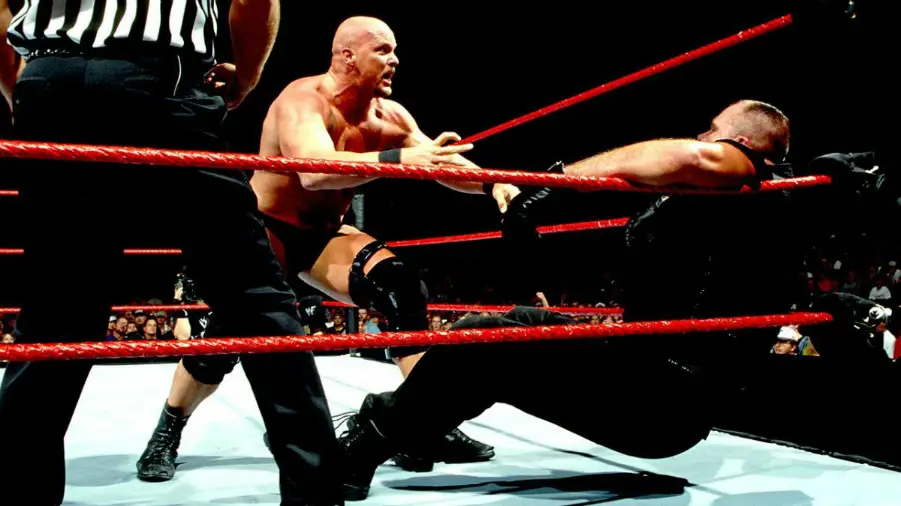 WWE
WWE
The 14-man tournament for the vacated WWE Championship was going to occupy all of the kingfish on the roster. Stone Cold, The Rock, The Undertaker, Kane, Mick Foley, and others were going to be far too busy to duke it out in those classic Survivor Series elimination bouts. But then again, *what* Survivor Series elimination bouts?
The only "eliminating" was going to come in the confines of the tournament, because 1998 would be the only Survivor Series without those anticipated battles among teams. Technically, 2002's show didn't have any "classic" elimination matches, but a three-on-three elimination table match fulfils the idea of a team elimination match, at least. The 1998 show did away with the idea of trios, quartets, and quintets duking it out in battles of attrition altogether.
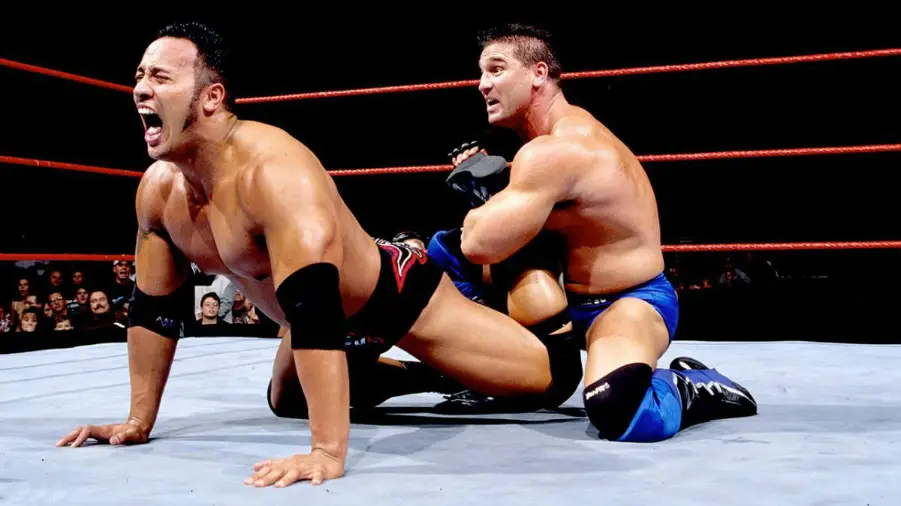 WWE
WWE
If WrestleMania IV taught us nothing else (aside from Bob Uecker being an absolute ace at being accosted by drunken fans), it's that putting a one-night, multi-round tournament on a pay-per-view means to expect a lot of matches, many of them at least somewhat abbreviated. The 1998 Survivor Series was assuming the same burden, along with a couple of non-tournament title bouts, and some pre-show skirmishes.
Counting a dark match, three Sunday Night Heat bouts, and the pay-per-view feast itself, the 1998 Survivor Series presented 18 matches that night in St. Louis. The dark match pitting Too Cool and The Hardy Boyz doesn't have a listed duration, but of the other 17 bouts, nine of them ran four minutes or less (including The Rock pinning Big Boss Man in an opening round match in three seconds).
[embed
[/embed]
Contrary to the gritty rap-rock and nu-metal that was taking a stronger hold of professional wrestling's soundtrack at the time, the theme song for Survivor Series 1998 was something entirely different. A Jim Johnston-composed track called "Deadly Game" came equipped with soulful vocals, downbeat funk, and an uneasy sense of impending doom. It's rather unlike much of WWE's musical fare from over the years.
Weirdly enough, the song would be resurrected more than seven years later, for another WWE pay-per-view. The 2006 No Way Out pay-per-view was backed by a cover of the theme, performed by Canadian rock band Theory of a Deadman. Theory captured a bit of the original's bleakness, albeit in electric rock form, naturally. The band also did a cover of Vince McMahon's "No Chance in Hell" for the Volume 8 CD that, near I can tell, has never been heard otherwise.
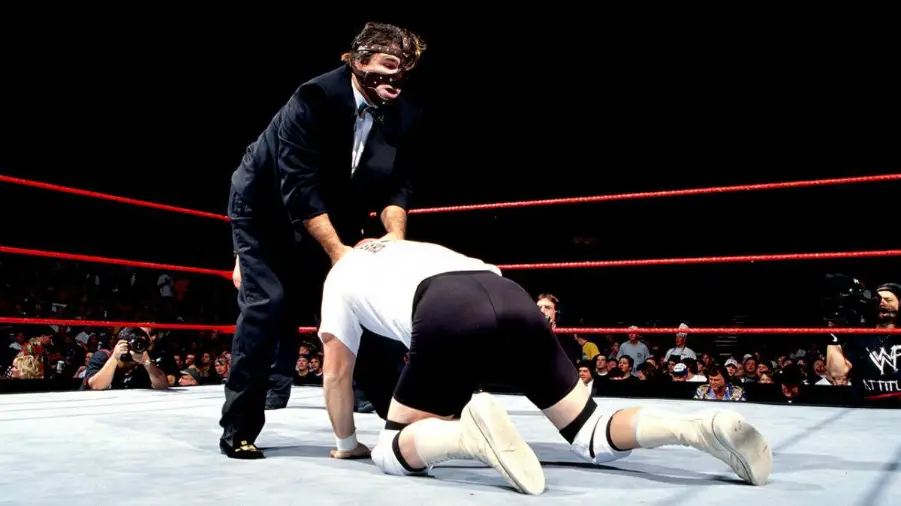 WWE
WWE
It was quite a hoot seeing legendary prelim guy Duane Gill show up Mankind's pushover opponent in the opening round. Even funnier was Vince McMahon's sterling introduction for Gill, noting that he once jumped to WCW to seek competition "of his own caliber" (Ha!). The masterstroke was Gill's Titantron video, which showed the journeyman being laid out by the finishing moves of more successful wrestlers. It was absurd brilliance at its best.
This shouldn't come as too much of a surprise, but after so many years of being on WWE events in some capacity, this was Gill's first ever pay-per-view match. An appearance in the 1999 Royal Rumble would follow, neither showing lasting longer than taking a few puffs of nasal spray.
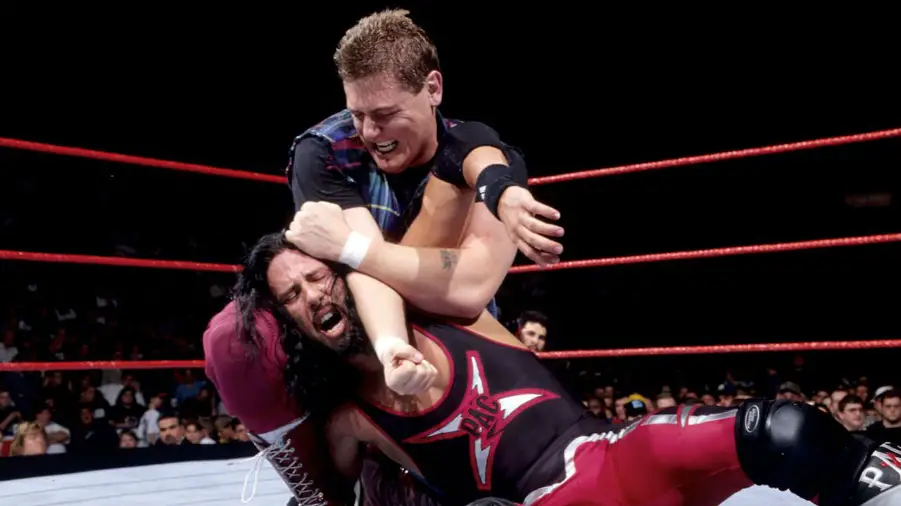 WWE
WWE
One of the more eclectic competitors in the tournament was Steven (not yet William) Regal, at the time absurdly costumed in flannel and a hard hat as the Real Man's Man. Regal had a serviceable match with X-Pac in the opening round, going to a double countout with the then-European Champion. Unfortunately for Regal, this WWE tenure would draw to a close shortly after.
Regal's past battles with addictions have been well documented, and only days after Survivor Series, Regal was sent home by the company, found to be in "no condition to perform," per Dave Meltzer. Regal checked into rehab in early 1999 to deal with an addiction to pain medication. He would find his way back to WWE in 2000, aided by a cleaner, healthier lifestyle, and an impressive performance against Chris Benoit at that year's Brian Pillman Memorial Show.
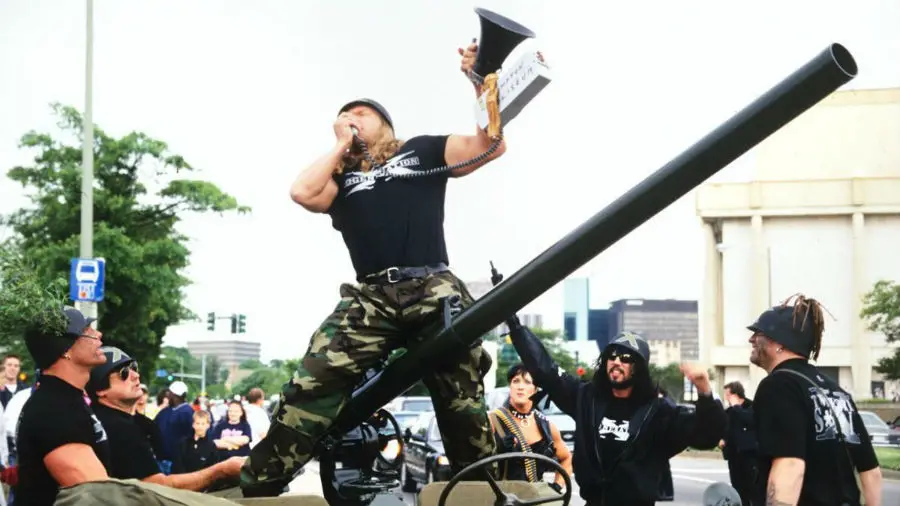 WWE
WWE
The original brackets for the WWE Championship tournament listed Triple H as The Rock's first-round opponent. Helmsley had been sidelined with a knee injury since mid-September, and said injury necessitated him vacating the Intercontinental Championship. The injury looked to sideline him for some time, though WWE continued to advertise Helmsley up and into the pay-per-view.
As noted earlier, Rock would actually end up wrestling Big Boss Man in the first round, presented under the guise of a corporate power play. It's interesting that WWE continued to advertise Helmsley as being an active participant for the show, especially given the nature of his injury. He would, however, return to the ring a couple of weeks following the pay-per-view, so it's possible that the Boss Man match could've been a last minute idea, if WWE expecting Helmsley to be healthy in time for the show.
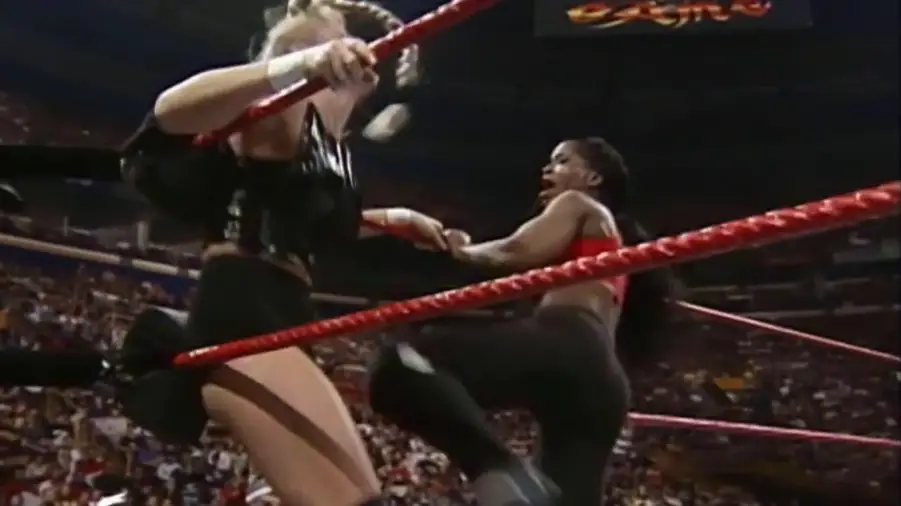 WWE
WWE
The other notable title change at the 1998 Survivor Series would see Sable defeat Jacqueline to become WWE Women's Champion. The belt had only been reinstated about two months earlier, won by Jacqueline over Sable in something of a half-assed top contender's match on Raw. With Sable, the division (if that's what you wanna call the 1998 version of it) had a true star on top, someone whose name could garner interest in PPV bouts.
The Sable/Jacqueline match marked the first defense of the WWE Women's title on a pay-per-view since Alundra Blayze lost the gold to Bertha Faye at SummerSlam 1995. Blayze regained the belt two months later on an episode of Raw, and would hold onto the belt before her firing later in 1995. Then she went onto Nitro and...well, you know.
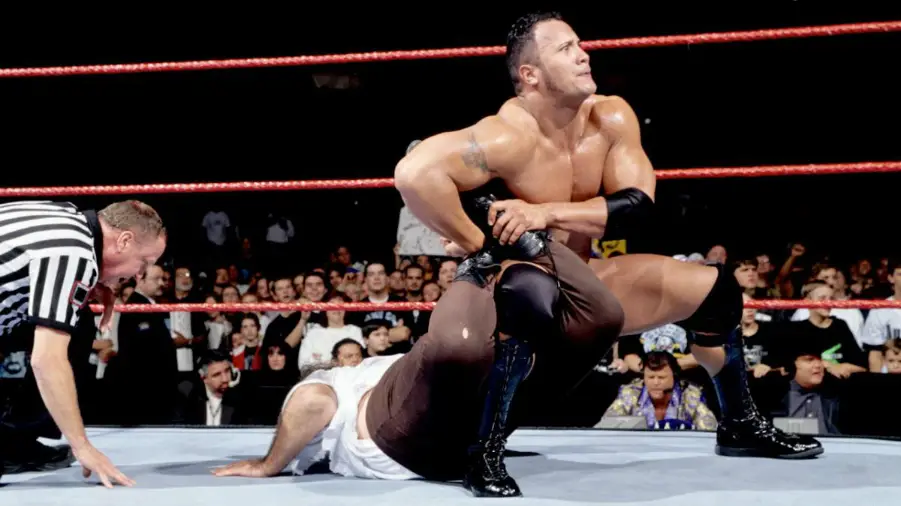 WWE
WWE
Just as the WrestleMania IV tournament final pitted two men who had never before held a World title, so too did the Deadly Games final match, as The Rock and Mankind would square off for the vacant WWE Championship. An entire DVD could be made of the best matches and moments involving Dwayne Johnson and Mick Foley's shared exploits, and this match would definitely be among them. But it wasn't looking good early on.
According to Foley, partially due to exhaustion from his prior matches, he had drawn a complete blank the moment he and Rock locked up. Unable to remember any ordained ideas, or simply where to go from that first collar-and-elbow, the two had to resort to an early resthold, where they could discreetly figure out some upcoming spots.
[embed
[/embed]
In the early days of the Attitude Era, WWE would run post-PPV shows on the Home Shopping Network, odd as that may sound. The idea was that wrestlers would cut post-event promos referencing their night's involvement, while also hawking their merchandise to potential customers. It's actually a pretty clever concept, and it did give us a rather funny moment after Survivor Series 1998.
The New Age Outlaws were being interviewed by Michael Hayes and they, well, were kind of on another planet in their behaviour and antics. They made some disparaging remarks about The Rock, who would alter respond in kind. After dressing Billy Gunn down as a perpetual failure, Rock began to insinuate about Road Dogg's "recreational" hobbies, before wisely cutting himself off and pressing onward. If nothing else, he may have explained why the Outlaws were a little silly in their earlier gabfest.
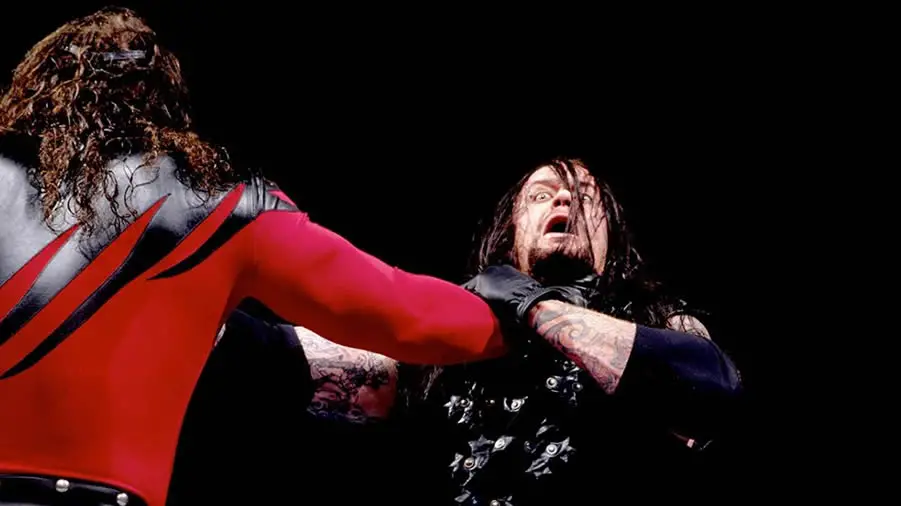 WWE
WWE
WWE's 1998 seemed to be graced with the Midas touch to end all golden streaks, as ratings were through the roof, and pay-per-views did bigger business than ever. SummerSlam set an all-time buyrate record for events bearing the name, and WrestleMania XIV almost did as well. Survivor Series would join SummerSlam in setting a mark that no event of its chronology has equalled before or since.
The 1998 Survivor Series would rake in the big bucks with 478,000 pay-per-view buys, which is, as noted, the most for any Survivor Series in history. It was only the second Survivor Series to reach the 400,000 buy mark, after the 1990 event hit that number, approximately. People just couldn't get enough of WWE in that glorious year, and the metrics all reflect that max interest.
The 14-man tournament for the WWE Championship is beset with scheming and rigging from the corporate lever-pullers, with a sense of unpredictability hanging in the air. Give me that over two "great workers" that spend 23 minutes giving us the moves they always do, before spending the next 90 seconds giving us whatever finish needed to justify the samey rematch.
People who say that the Attitude Era isn't about the wrestling sometimes overlook genuinely great standalone matches, but Survivor Series 1998 exists to prop up their argument. It's the sort of story-driven madness with carefully-executed twists that gets all of us older fans feeling so damn rosy about yesteryear.
10. Breaking From Tradition
 WWE
WWEThe 14-man tournament for the vacated WWE Championship was going to occupy all of the kingfish on the roster. Stone Cold, The Rock, The Undertaker, Kane, Mick Foley, and others were going to be far too busy to duke it out in those classic Survivor Series elimination bouts. But then again, *what* Survivor Series elimination bouts?
The only "eliminating" was going to come in the confines of the tournament, because 1998 would be the only Survivor Series without those anticipated battles among teams. Technically, 2002's show didn't have any "classic" elimination matches, but a three-on-three elimination table match fulfils the idea of a team elimination match, at least. The 1998 show did away with the idea of trios, quartets, and quintets duking it out in battles of attrition altogether.
9. Loaded Show
 WWE
WWEIf WrestleMania IV taught us nothing else (aside from Bob Uecker being an absolute ace at being accosted by drunken fans), it's that putting a one-night, multi-round tournament on a pay-per-view means to expect a lot of matches, many of them at least somewhat abbreviated. The 1998 Survivor Series was assuming the same burden, along with a couple of non-tournament title bouts, and some pre-show skirmishes.
Counting a dark match, three Sunday Night Heat bouts, and the pay-per-view feast itself, the 1998 Survivor Series presented 18 matches that night in St. Louis. The dark match pitting Too Cool and The Hardy Boyz doesn't have a listed duration, but of the other 17 bouts, nine of them ran four minutes or less (including The Rock pinning Big Boss Man in an opening round match in three seconds).
8. The Game Continues On
[embed
[/embed]
Contrary to the gritty rap-rock and nu-metal that was taking a stronger hold of professional wrestling's soundtrack at the time, the theme song for Survivor Series 1998 was something entirely different. A Jim Johnston-composed track called "Deadly Game" came equipped with soulful vocals, downbeat funk, and an uneasy sense of impending doom. It's rather unlike much of WWE's musical fare from over the years.
Weirdly enough, the song would be resurrected more than seven years later, for another WWE pay-per-view. The 2006 No Way Out pay-per-view was backed by a cover of the theme, performed by Canadian rock band Theory of a Deadman. Theory captured a bit of the original's bleakness, albeit in electric rock form, naturally. The band also did a cover of Vince McMahon's "No Chance in Hell" for the Volume 8 CD that, near I can tell, has never been heard otherwise.
7. The Streak Begins
 WWE
WWEIt was quite a hoot seeing legendary prelim guy Duane Gill show up Mankind's pushover opponent in the opening round. Even funnier was Vince McMahon's sterling introduction for Gill, noting that he once jumped to WCW to seek competition "of his own caliber" (Ha!). The masterstroke was Gill's Titantron video, which showed the journeyman being laid out by the finishing moves of more successful wrestlers. It was absurd brilliance at its best.
This shouldn't come as too much of a surprise, but after so many years of being on WWE events in some capacity, this was Gill's first ever pay-per-view match. An appearance in the 1999 Royal Rumble would follow, neither showing lasting longer than taking a few puffs of nasal spray.
6. A Rough Patch
 WWE
WWEOne of the more eclectic competitors in the tournament was Steven (not yet William) Regal, at the time absurdly costumed in flannel and a hard hat as the Real Man's Man. Regal had a serviceable match with X-Pac in the opening round, going to a double countout with the then-European Champion. Unfortunately for Regal, this WWE tenure would draw to a close shortly after.
Regal's past battles with addictions have been well documented, and only days after Survivor Series, Regal was sent home by the company, found to be in "no condition to perform," per Dave Meltzer. Regal checked into rehab in early 1999 to deal with an addiction to pain medication. He would find his way back to WWE in 2000, aided by a cleaner, healthier lifestyle, and an impressive performance against Chris Benoit at that year's Brian Pillman Memorial Show.
5. Hampered Hunter
 WWE
WWEThe original brackets for the WWE Championship tournament listed Triple H as The Rock's first-round opponent. Helmsley had been sidelined with a knee injury since mid-September, and said injury necessitated him vacating the Intercontinental Championship. The injury looked to sideline him for some time, though WWE continued to advertise Helmsley up and into the pay-per-view.
As noted earlier, Rock would actually end up wrestling Big Boss Man in the first round, presented under the guise of a corporate power play. It's interesting that WWE continued to advertise Helmsley as being an active participant for the show, especially given the nature of his injury. He would, however, return to the ring a couple of weeks following the pay-per-view, so it's possible that the Boss Man match could've been a last minute idea, if WWE expecting Helmsley to be healthy in time for the show.
4. One For The Women
 WWE
WWEThe other notable title change at the 1998 Survivor Series would see Sable defeat Jacqueline to become WWE Women's Champion. The belt had only been reinstated about two months earlier, won by Jacqueline over Sable in something of a half-assed top contender's match on Raw. With Sable, the division (if that's what you wanna call the 1998 version of it) had a true star on top, someone whose name could garner interest in PPV bouts.
The Sable/Jacqueline match marked the first defense of the WWE Women's title on a pay-per-view since Alundra Blayze lost the gold to Bertha Faye at SummerSlam 1995. Blayze regained the belt two months later on an episode of Raw, and would hold onto the belt before her firing later in 1995. Then she went onto Nitro and...well, you know.
3. Mick's Faulty Memory
 WWE
WWEJust as the WrestleMania IV tournament final pitted two men who had never before held a World title, so too did the Deadly Games final match, as The Rock and Mankind would square off for the vacant WWE Championship. An entire DVD could be made of the best matches and moments involving Dwayne Johnson and Mick Foley's shared exploits, and this match would definitely be among them. But it wasn't looking good early on.
According to Foley, partially due to exhaustion from his prior matches, he had drawn a complete blank the moment he and Rock locked up. Unable to remember any ordained ideas, or simply where to go from that first collar-and-elbow, the two had to resort to an early resthold, where they could discreetly figure out some upcoming spots.
2. High Comedy
[embed
[/embed]
In the early days of the Attitude Era, WWE would run post-PPV shows on the Home Shopping Network, odd as that may sound. The idea was that wrestlers would cut post-event promos referencing their night's involvement, while also hawking their merchandise to potential customers. It's actually a pretty clever concept, and it did give us a rather funny moment after Survivor Series 1998.
The New Age Outlaws were being interviewed by Michael Hayes and they, well, were kind of on another planet in their behaviour and antics. They made some disparaging remarks about The Rock, who would alter respond in kind. After dressing Billy Gunn down as a perpetual failure, Rock began to insinuate about Road Dogg's "recreational" hobbies, before wisely cutting himself off and pressing onward. If nothing else, he may have explained why the Outlaws were a little silly in their earlier gabfest.
1. Money To Survive
 WWE
WWEWWE's 1998 seemed to be graced with the Midas touch to end all golden streaks, as ratings were through the roof, and pay-per-views did bigger business than ever. SummerSlam set an all-time buyrate record for events bearing the name, and WrestleMania XIV almost did as well. Survivor Series would join SummerSlam in setting a mark that no event of its chronology has equalled before or since.
The 1998 Survivor Series would rake in the big bucks with 478,000 pay-per-view buys, which is, as noted, the most for any Survivor Series in history. It was only the second Survivor Series to reach the 400,000 buy mark, after the 1990 event hit that number, approximately. People just couldn't get enough of WWE in that glorious year, and the metrics all reflect that max interest.
